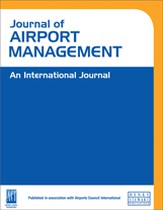Security screening process of passengers in Brazilian airports: Bivariate analysis of human errors and factors
Abstract
The airport security processes, specifically those applied during passenger checkpoint security, suffer from a lack of studies on the identification, quantification, causes and impact of human error. This paper aims to examine the associations between various factors and human errors that can affect the operational environment of checkpoint security. In the bi-dimensional analysis, it was verified that there was a considerable association between some variables, which enables the authors to predict certain factors and human errors.
The full article is available to subscribers to the journal.
Author's Biography
Michelle Salgado Ferreira Arcúrio has a Masters degree in Transportation from the University of Brasilia (2014), a Masters in Science Education from Universidad de Los Pueblos de Europa (2009) and Specialised in Institutional Psychopedagogy from the Castelo Branco University (2006). She graduated in Pedagogy (2003) and in Educational Advisor from the University of Brasilia (2006). She worked as an elementary school teacher and as a school coordinator for five years. Since 2007, she has been working as a Civil Aviation Regulation Specialist at the Brazilian Civil Aviation Authority, known as National Civil Aviation Agency (ANAC). She has experience in the fields of civil aviation training, operational safety and has worked in the aviation security area since 2010.
Eliane Shizuka Nakamura has an MSc and PhD in Pharmaceutical Sciences from Toyama Medical and Pharmaceutical University, she graduated in Biological Sciences at University of Brasília. Since 2007 she has worked as an administrative analyst at the Brazilian Civil Aviation Authority, known as National Civil Aviation Agency – ANAC in the fields of civil aviation training, operational safety and aviation security.
Rafael Rodrigues Dias Pereira has a Masters in Transportation from the University of Brasilia (2016). He graduated in Electrical Engineering from the Federal University of Goiás (2006). He has worked in industrial processes in the areas of planning of production and maintenance for a year. Since 2007, he has held the position of Civil Aviation Regulation Specialist at ANAC. He has experience in the areas of regulation and supervision of civil aviation with an emphasis on airport and airlines security.
Talita Armborst has a Master’s degree in Statistics from the Federal University of Minas Gerais (UFMG) (2005), with a statistical research line focused on genetics. She graduated in Statistics from the Federal University of Rio Grande do Sul (UFRGS) (2003). She has worked at several institutions including Oswaldo Cruz Foundation, known as Fiocruz; Department of Studies and Research of Ministry of Health; and the National Institute for Educational Studies and Research ‘Anísio Teixeira’, known as Inep. Since 2007, she has worked at ANAC as a Civil Aviation Regulation Specialist. Over her years at ANAC, her researcher duties are related to the analysis of air transportation data for Brazilian and foreign airlines.
José Augusto Abreu Sá Fortes graduated in Economics from the Federal University of Santa Catarina (1979). He received a Master’s degree in Urbanisme et Aménagement from University of Paris XII (Paris-Val-de-Marne) (1984), a Doctorate in Urbanisme from Universite Paris XII (Paris-Val-de-Marne) (1989) and Post doctorate from the Université de Paris I at Sorbonne. He is now Adjunct Professor of the Department of Civil and Environmental Engineering, Faculty of Technology, University of Brasilia. His research has an emphasis on the following topics: economics, finance, organisation of production processes, urban transportation planning, mobility, ports and tourism.
